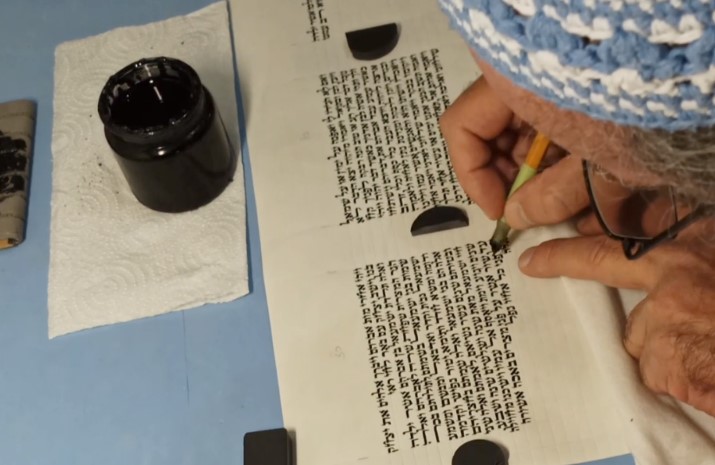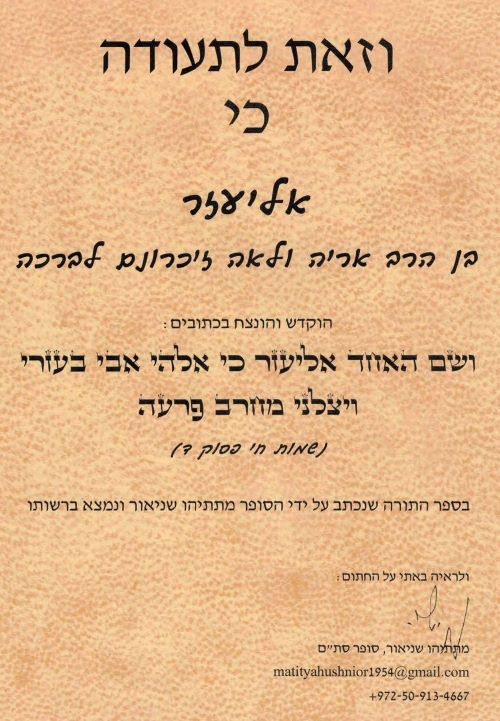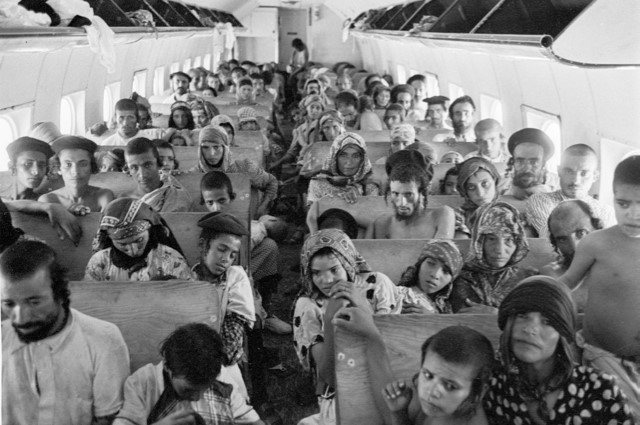Introduction
Parashat Yitro may be among the most important Parashot in Torah. It describes in details the first public interaction between the People of Israel and HaShem. During that event, at the foot of mount Sinai, The People hear HaShem calling out the Ten Commandments. And sorry to disappoint you – I am not going to talk at all about the Ten Commandments! Not that I have nothing to say – I did in an essay that compares the two versions of the Commandments. That article provoked a conversation with a friend about some of the teachings one can glean from them.
I encourage you to follow the courage that D, my friend, demonstrated and engage in a conversation with me. It can be about any of the articles you read in my website, or anything else that crosses your mind. There is a lot in the Parasha besides the Ten Commandments, and we will try to explore, at least a few of those gems.
My Personal Connection to Parashat Yitro.
Right at the very beginning of the Parasha, we learn a bit more about Moshe’s family. We already know that his wife is Zipporah, the daughter of Yitro. And that his firstborn son is Gershom which means in Hebrew ‘I am a stranger in a foreign land’. In Parashat Shemot (Exodus 4:24-26) we also learned that Moshe have sinned, by not circumcising his sons. Zipporah is the one that did it, and by that, saved Moshe’s neck. In this Parasha we read about his other son, Eliezer. Moshe named his son Eliezer in gratitude to God for saving his life (Exodus 18:4):
And the other’s name is Eliezer [Eli – my God, Ezer- helper]. [Saying] “The God of my father’s [house] was my help, delivering me from the sword of Pharaoh.”
וְשֵׁ֥ם הָאֶחָ֖ד אֱלִיעֶ֑זֶר כִּֽי אֱלֹהֵ֤י אָבִי֙ בְּעֶזְרִ֔י וַיַּצִּלֵ֖נִי מֵחֶ֥רֶב פַּרְעֹֽה׃
Eliezer is also the name of my brother, that fell during his duty in the Israeli Navy in 1949. One of the tradition to commemorate a loved one is dedicate a verse in Torah that is being written. The only other appearance of ‘Eliezer’ in Torah is in Genesis 15:2, and refers to the household member of Avraham. Obviously, I preferred the verse that calls out the name of Moshe’s son over the other appearance.
I asked My friend, a Torah Scribe, to commemorate my brother with this verse in the Torah scroll he wrote. There is yet another good omen in the location of this verse. Using the Hebrew letters that correspond to 18 (the chapter’s number), create the word חַי, Ḥahy, meaning in Hebrew Alive. My hope is that the memory of Eliezer my brother will continue living for many years to come.

Above: A Sofer Stam (Scribe) writes a scroll of Torah.
Right: A certificate that verse Exodus 18:4 is dedicated in the memory of my brother, Eliezer Z”L.

What is Not Good in Yitro’s View?
In Torah, there are only two places that clearly state something is wrong, Not Good: לֹא טוֹב – LO TOV. Let’s explore these two incidents and try to derive to conclusions that are applicable to us today.
The First Appearance (Genesis 2:18):
The LORD God said, “It is not good for the man to be alone; I will make for him a helper, a counterbalance to oppose him.”
וַיֹּ֙אמֶר֙ יְהוָ֣ה אֱלֹהִ֔ים לֹא ט֛וֹב הֱי֥וֹת הָֽאָדָ֖ם לְבַדּ֑וֹ אֶֽעֱשֶׂהּ לּ֥וֹ עֵ֖זֶר כְּנֶגְדּֽוֹ׃
The first citing describes Adam being alone and lonely, isolated, only by himself, with no one to help him. The Hebrew word used is LEVADO – which means all the above.
In order to resolve this, God creates – yet without any reference to gender – Ezer – a helper. However, it is not just a helper: certainly not the ultimate Yes-man (regardless the gender): It is – K’NEGDO – opposite to, against, countering, in exchange to, as opposed to. Later on, we read (Genesis 2:24) that “for that, the human being will leave his parents and cling to his/her spouse so that they become one flesh”.
This is the formation of the first homo-sapiens team: two (as a minimum) that cling together and stick with each other, despite differences in views. These differences nourish the team-couple, as it calls also to respect and cherish the other’s opinion. Out of disagreements and the different views a better understanding of the situation emerges. Based on that exchange of thoughts, the team agrees and eventually moves forward as a unity that includes the differences.
The Second Appearance (Exodus 18:17):
Moshe’s father-in-law said to him, “The thing you are doing is not good;
וַיֹּ֛אמֶר חֹתֵ֥ן מֹשֶׁ֖ה אֵלָ֑יו לֹא טוֹב֙ הַדָּבָ֔ר אֲשֶׁ֥ר אַתָּ֖ה עֹשֶֽׂה׃
Parashat Yitro describes a similar situation: Yitro observes Moshe (Exodus 18:13): “magistrates among the people… … from morning until evening”. He asks: “Why are you sitting LEVADEKHA?”, using the same words as in our first case. In other words, why are you sitting alone, lonely, isolated, doing everything by yourself? He adds that no one – even not Moshe – can do such things alone (18:18): you cannot do it LEVADEKHA.
Yitro suggests that first, Moshe warns the People about the laws and informs them which direction they must follow (18:20): “Make sure they know the way they must follow and the deeds the have to do”. Then, Moshe needs to envision those who he will select from the People, according to well-defined criteria. These persons of valor must have track record of being truthful, filled with awe (fear) of God, and hate greed. They will form a four-level hierarchy of leaders and judges, that will continue teaching and directing the people, offloading Moshe from the daily chores. Moshe will remain the ultimate teacher and arbitrator that will convey God’s Words to the People through the leaders.
The end result of implementing this system will be that (Exodus 18:23):
All this People (Am – nation, People, community) will come into a state, a place, of Shalom – peace, content, as a whole, in unity, together.
כָּל הָעָ֣ם הַזֶּ֔ה עַל מְקֹמ֖וֹ יָבֹ֥א בְשָׁלֽוֹם׃
Applying This Principle Today, in Our Lives.
The Judicial System of the Western World (and I presume other countries’ as well) follow a similar system. Here in the US, we have (in some cases) 4 levels of Justice courts: the State’s District Court, the State’s Appeal Court and the Supreme Court of the State are three of them. In some cases, one can also appeal to the Federal Supreme Court whose verdict would be final.
Similar hierarchy exists also in the Government, and corporations’ management systems. One can argue and challenge: where is the Separation of Powers? Those chiefs, ministers, rulers, leaders (the various translations for the Hebrew word used in Torah) are also the judges. Well, we can find the principle of Separation of Powers both Torah and later the Prophets. The various arms may have different names and functions, but the ideal exists.
In my engineering and management experience I learned that no one, talented as one may be, can do things alone. It takes a multidisciplinary team to make things happen. There is a limit to the control and leadership span a single person can effectively handle. To be able to lead a large team, a company, a People the top leader must delegate and empower capable managers under him/her. Yes, we all know that today; learning that it originated several thousand years earlier is a wonder of and in itself.
I propose to expand the insight of the last verse (18:23) to “it takes a village to raise a child”. And it is not just raising a child, but also healing, building a community, helping the weak in our midst. I experienced it first hand when I needed the support and help of others to heal. It takes a village – starting with leadership that listens, empowers, leads with openness, curiosity and compassion. Then the village will follow.
Who Was the First to Receive Torah?
The answer to this question is hidden in Exodus 19:3:
And Moshe went up to God; Adonai called to him from the mountain, saying: “Thus shall you say to The House of Ya-akov and tell The Children of Israel”.
וּמֹשֶׁ֥ה עָלָ֖ה אֶל הָאֱלֹהִ֑ים וַיִּקְרָ֨א אֵלָ֤יו יְהֹוָה֙ מִן הָהָ֣ר לֵאמֹ֔ר כֹּ֤ה תֹאמַר֙ לְבֵ֣ית יַעֲקֹ֔ב וְתַגִּ֖יד לִבְנֵ֥י יִשְׂרָאֵֽל׃
Several commentators were puzzled by the duplication of the “House of Ya-akov” and the “Children of Israel”. I discussed the meaning and use of the two names, Ya-akov and Yisrael, in the article on Parashat Vayishlach.
Rashi, in his commentary on this verse, quotes Mekhilta d’Rabbi Yishmael. “Thus shall you say”: in Hebrew, the holy tongue, “Thus” means in this particular order. “Thus” also means on this matter. “Thus” – that you do not detract nor add to the words. “To the House of Ya-akov” – these are the women; “speak to the Children of Israel” – refer to the men. “Thus shall you say to the House of Ya-akov” – say it gently, give the women the basic ideas. “Speak to [tell] the Children of Israel” – tell all the details to the men.
Rabbenu Baḥyah elaborates:
The reason God told Moshe to address the women first was to teach them ethics and general rules of behavior. Moshe gave them an overview of the headings and subject matters that the Torah contains. This approach helped the women be more receptive for further Torah legislation. They needed a different approach as their minds function differently compared to men.
Moreover, a good woman is the main contributor to the future of Torah. The mother encourages her children to attend to a Torah Academy. Being at home throughout the day she responds to her children’s needs and protects them from all kinds of dangers. By doing so, the children will cleave to the path of Torah also when they become older. Lighting Shabbat Candles is a Mitzvah that is dedicated to women, so they can pray to HaShem at that time. They pray, among other pleas, such as healing prayers, for children that will study Torah and observe its precepts. It is well known that prayers offered during the performance of a Mitzvah are likely to evoke a positive response.
“Tell the Children of Israel”: He commanded Moshe to then instruct and warn the men to observe the commandments. Moshe also informed them what would be the penalties in store if they failed to observe God’s laws. Rabbenu Baḥyah concludes it from the use of the Hebrew word תַּגִיד – Tagid, tell. It sounds and associates with another word, גִידִין – gidin – which means wormwood, an extremely bitter and toxic vegetable.
We all agree that Torah is millennia years old; scholars estimate that its canonization was around 5th century BCE. Certainly, the culture then was less egalitarian than it is today, which makes reading Torah with today’s ideals quite difficult. A 750 years old interpretation that upholds the role of women is refreshing and brings hope that there are more. We only need to search for it and find the ways to read Torah with the principles of equality in mind.
I will Carry You on Eagles’ Wings
In the next verse, 19:4, God promises to bring the People to Him on the wings of eagles:
You saw what I did to the Egyptians; I lifted and carried you on eagles’ wings and brought you to Me.
אַתֶּ֣ם רְאִיתֶ֔ם אֲשֶׁ֥ר עָשִׂ֖יתִי לְמִצְרָ֑יִם וָאֶשָּׂ֤א אֶתְכֶם֙ עַל כַּנְפֵ֣י נְשָׁרִ֔ים וָאָבִ֥א אֶתְכֶ֖ם אֵלָֽי׃
This verse convinced the Yemenite Jews to board the airplanes, a bird they never saw before, and fly to Israel. Operation ‘Magic Carpet’, better known as ‘On Eagles’ Wings’ brought between 1949 and 1950 to Israel about 50,000 Yemenite Jews. The risk to their lives increased drastically after the State of Israel was established, and Israel won the 1948 war. It was imperative to take them out of Yemen in an air train. Yemen and Israel were then at a state of war and the long distance added complexities to the operation. Read more about it in Paragraph “Operation Magic Carpet” in the El-Al book, from which I share a few photos.

Yemenite Jews inside the”Eagle”

El-Al airplane in disguise landed in Isarel , Lod Airport.
Priestly Kingdom and Holy People
Another pivotal couple verses (19:5-6), in my opinion, are following the previous one:
Now then, if you will hear [and listen], harken [and obey] to my words, and guard [and cherish] My Covenant… …you shall be to Me a kingdom of priests and a Holy People [Nation].
וְעַתָּ֗ה אִם שָׁמ֤וֹעַ תִּשְׁמְעוּ֙ בְּקֹלִ֔י וּשְׁמַרְתֶּ֖ם אֶת בְּרִיתִ֑י… … וְאַתֶּ֧ם תִּהְיוּ לִ֛י מַמְלֶ֥כֶת כֹּהֲנִ֖ים וְג֣וֹי קָד֑וֹשׁ
Rabbenu Baḥyah gives a mystical, Kabbalistic, interpretation to this verse. The words Kingdom of Priests, “a kingdom of servants of the Lord”, refers to the Jewish People. More specifically, to their role in HaOlam HaZeh – This World, the terrestrial world. The definition ‘Holy People’ defines the function of the Jewish People in HaOlam HaBah – the World to Come, the hereafter. It means that the Jewish People is “a nation belonging to The Holy One.” Basically, our verse assures the Jewish People has a dominant role both on earth and beyond.
Rabbi Jonathan Sacks provides an excellent definition of a Covenant, that clearly distinguishes it from a contract. ‘A Covenant is the bond by which two parties pledge themselves to one another. Each commit to respect the freedom and integrity of the other. And they agree to join their separate destinies into a single journey that they will travel together, saying (Psalm 23:4): “Fearing no evil, for You are with me”. Unlike a contract, it is an open-ended relationship lived toward an unknown future.’
Conclusion
Our eternal Covenant with God, puts a certain role, a burden, on us. We, individuals that make a community, and communities that make the Jewish People, are in this Covenant. In This World, we need to act as God’s Executive Arm, executing His ideas how to make the world better. We need to be Or LaGoyim – the Light to the Nations. This light serves as a beacon that shows the direction, and also illuminates obstacles and opportunities along the path. This mindset is what we call Tikkun Olam – fixing, repairing, the world. It seems that so far we are doing OK, considering the per‑capita contribution of the Jewish People to the world. And we need to continue doing so.
In parallel, HaShem will also keep his part in the Covenant, and will walk with us into the future. This adhered to Covenant will ensure that Am Yisrael will endure forever.